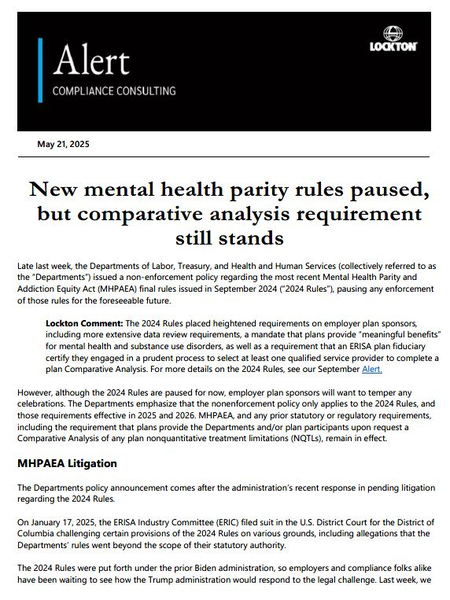Late last week, the Departments of Labor, Treasury, and Health and Human Services (collectively referred to as the “Departments”) issued a non-enforcement policy regarding the most recent Mental Health Parity and Addiction Equity Act (MHPAEA) final rules issued in September 2024 (“2024 Rules”), pausing any enforcement of those rules for the foreseeable future.
Lockton Comment: The 2024 Rules placed heightened requirements on employer plan sponsors, including more extensive data review requirements, a mandate that plans provide “meaningful benefits” for mental health and substance use disorders, as well as a requirement that an ERISA plan fiduciary certify they engaged in a prudent process to select at least one qualified service provider to complete a plan Comparative Analysis. For more details on the 2024 Rules, see our September Alert. (opens a new window)
However, although the 2024 Rules are paused for now, employer plan sponsors will want to temper any celebrations. The Departments emphasize that the nonenforcement policy only applies to the 2024 Rules, and those requirements effective in 2025 and 2026. MHPAEA, and any prior statutory or regulatory requirements, including the requirement that plans provide the Departments and/or plan participants upon request a Comparative Analysis of any plan nonquantitative treatment limitations (NQTLs), remain in effect.
MHPAEA Litigation
The Departments policy announcement comes after the administration’s recent response in pending litigation regarding the 2024 Rules.
On Jan. 17, 2025, the ERISA Industry Committee (ERIC) filed suit in the U.S. District Court for the District of Columbia challenging certain provisions of the 2024 Rules on various grounds, including allegations that the Departments’ rules went beyond the scope of their statutory authority.
The 2024 Rules were put forth under the prior Biden administration, so employers and compliance folks alike have been waiting to see how the Trump administration would respond to the legal challenge. Last week, we got our answer when the Departments filed a Motion for Abeyance, asking the Court to pause the litigation until the Departments can review the 2024 Rules and determine if modifications or a recission are required. The filed Motion also alluded to the issuance of this nonenforcement policy.
The nonenforcement policy
As stated above, the Departments’ nonenforcement policy pauses any enforcement of the new requirements under the 2024 Rules which had rolling applicability dates in 2025 and 2026, including the requirement that a plan fiduciary certify a prudent process was used in selecting a service provider to assist in preparing and documenting the Comparative Analysis and heightened data review requirements.
Interestingly, the Departments nonenforcement policy also indicated The Departments would be examining the current enforcement approach under MHPAEA, including those provisions amended by the Consolidated Appropriations Act of 2021 (CAA).
Lockton Comment: The Comparative Analysis was promulgated under the CAA. Since 2021, employers, carriers and industry partners have continuously pushed the Departments for more clarity as to what they would deem to be a sufficient Comparative Analysis. Prior guidance has provided some insight into what information should be included in the Comparative Analysis. However, employer plan sponsors and carriers still struggle with compliance as evidenced by the MHPAEA Report to Congress finding that no Comparative Analysis received as of the date of the report was sufficient when first provided to regulators. The Departments have yet to provide an example of a Comparative Analysis that the Departments would deem sufficient.
We are hopeful that the Departments’ examination of the 2024 Rules might result in further guidance and clarity of MHPAEA requirements, as well as a model Comparative Analysis to better assist employer plan sponsors in compliance with the parity rules.
The nonenforcement policy will remain in effect until 18 months after a final decision in the pending litigation.
Where does this leave employer plan sponsors?
The nonenforcement policy does not change any of the current MHPAEA statutory and regulatory requirements, and employer plan sponsors will need to ensure compliance with these standing parity requirements.
Employers will also want to review their plans with their advisors, carriers and/or third-party administrators (TPAs) for compliance with current MHPAEA requirements and identify any potential red flags or problematic provisions. The MHPAEA Comparative Analysis obligation remains in effect. Employers will want to ensure they have a Comparative Analysis of any plan nonquantitative treatment limitations that evaluates and sufficiently supports all plan NQTLs and includes the rationale, findings, and conclusions to demonstrate compliance with the current MHPAEA rules and guidance.
Lockton Comment: The DOL self-compliance tool (opens a new window) is a good resource to help review group health plans for MHPAEA compliance. Additionally, the MHPAEA Report to Congress (opens a new window) provides insights into the Departments’ enforcement efforts and highlights various cases, providing a list of plan provisions that the Departments have deemed problematic.
Going forward, as employer-plan sponsors enter contracts with carriers and TPAs, they should consider including contract provisions requiring the carrier/TPA to administer the plan in accordance with MHPAEA requirements, including providing a complete Comparative Analysis, and assisting the employer in reviewing data and plan network information to show the plan operates in accordance with MHPAEA.
Lockton’s Compliance Consulting practice will keep you apprised of any changes going forward.
Not legal advice: Nothing in this alert should be construed as legal advice. Lockton may not be considered your legal counsel, and communications with Lockton's Compliance Consulting group are not privileged under the attorney-client privilege.

